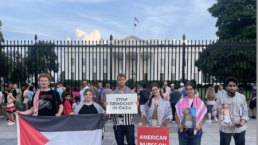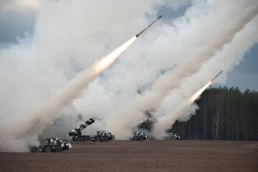What I saw and experienced in the West Bank was so frightening that I knew upon my return I had to do all I could to amplify their truth and fight for the liberation of Palestine and her people: I owed it to them.
By Nurse Practitioner Jennifer Koonings
I am on day nine of a voluntary hunger strike while Palestinians in Gaza are being starved to death. It is estimated that 3500 children are at risk of death in the coming weeks due to starvation. Two million people are trapped in the besieged Gaza strip, half of them under the age of 18.

There were roughly 1000 aid trucks entering weekly before May 6, 2024 – grossly inadequate for the need – but since the start of Israel’s ground offensive into Rafah – only a trickle of aid trucks have made it through – deepening the humanitarian crisis and man made famine.
I was recently a participant on the latest Gaza Freedom Flotilla that aimed to bring 5500 tonnes of lifesaving humanitarian aid to Gaza, but unfortunately that mission was sabotaged by Israeli interference with the country that flagged our ships.
Concerned civilians are not even allowed to carry out our moral and legal obligation of delivering life saving aid when our governments fail to do so. The aid we hoped to bring directly to Gaza ended up getting delivered to Egypt to get in the miles long line of trucks waiting to cross the border, some of the perishable food rotting away in the desert sun.
Hoping there would only be a minor delay until we boarded the flotilla, I made my way to the West Bank to be a human rights observer. In my two weeks in the West Bank, it felt like I had stepped onto the set of a horror movie. An acutely horrific phase of a fast genocide is being carried out in Gaza – but in the West Bank, a slow genocide is happening – funded and fueled by the United States and kept hidden away from the rest of the world.
Palestinians in the West Bank are kept so under the Israeli Occupation’s thumb- their every move surveilled, their every step controlled, their every word policed. The sense of being “caged in” is inescapable. When I left the West Bank, I felt like I could finally take a deep breath again.
After I left the West Bank while in Amman, Jordan in my seemingly helpless desperation about the sadistic suffering imposed on the Palestinians, I thought about starting a hunger strike and decided to begin one upon my return to the United States and having the hunger strike in front of President Joe Biden at the White House.
Why Do a Hunger Strike?
People have asked me: why do you do a hunger strike?
Do you really think you will change anything with this?
Why don’t you just eat something?
And my explanation for being on a hunger strike is: after being in Palestine, in the West Bank, you realize that the people living there look at us like we have the power to change something.
Here in America we may think our voices do not matter, but we have access to the people, the decisions and the places of incredible power that those in the colonized world could never dream of- inside our Congress and across from the White House.
In Palestine, when people would hear I was from America, in every conversation, they wanted to talk about the encampments on college campuses. They were so proud of the students and the encampments gave them some hope after the occupation had taken just about everything from them.
What I saw and experienced in the West Bank was so frightening that I knew upon my return I had to do all I could to amplify their truth and fight for the liberation of Palestine and her people: I owed it to them.
As many have reminded me, I am not famous, I am not important – I am just one person – yes, I know this.
But how could I amplify my one small voice as loud as possible to advocate for those suffering under this sadistic occupation? I decided go to the belly of the beast (DC) and protest in a way that’s not the norm.
People look at me like I am suffering needlessly for the cause and I would point out that while I have not eaten in nine days, I still have every other comfort available to me, while those in Gaza do not. I have clean water. I have a hot shower and indoor plumbing. I have a bed to sleep in and a roof over my head. I am not being bombed.
We Cannot Be Comfortable During a Genocide
So no, I am not suffering. Giving up the “comfort” of food has been an incredible exercise in solidarity and something I would recommend to almost anyone interested in trying. Being too comfortable in our excess here in the West has kept many from being true allies in this fight. We all need to get uncomfortable. Discomfort is how we grow. Comfortable is stagnant, and we cannot afford to be stagnant in this moment. Our world, our people and our future depend on it.
Jennifer Koonings is a psychiatric nurse practitioner and sexual assault forensic examiner for adults and children in New York City. She was a recent participant of the Gaza Freedom Flotilla.
Recent Posts
Mayor Mamdani’s First Day, A Zero Hour Conversation With Richard Wolff
July 2, 2025
Take Action Now If elected, what would Mayor Mamdani do on his first day in City Hall? How would a democratic socialist govern as a big-city mayor?……
The U.S. Is Funding A Bloodbath At Gaza Aid Centers
July 2, 2025
Take Action Now The admin just gave $30M to GHF, the organization at the center of charges that Israel is weaponizing assistance and shooting at…
Feeding The Warfare State
July 1, 2025
Take Action Now We Lose, the Weapons Makers WinBy William D. Hartung, Tom Dispatch The Senate is on the verge of passing the distinctly misnamed…
The Rage Of Billionaires And The Frenzy To Stop Zohran Mamdani From Becoming New York’s Mayor
June 30, 2025
Take Action Now The constellation of forces now regrouping with a vengeance includes titans of Wall Street, enormous real estate interests,…




